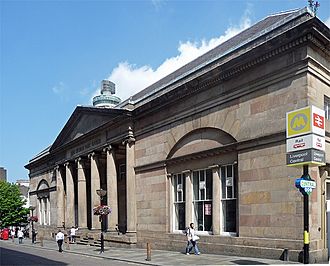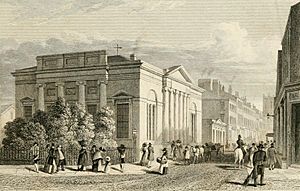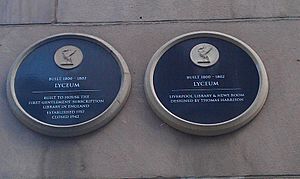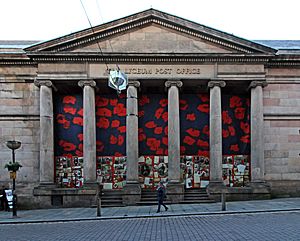The Lyceum, Liverpool facts for kids
Quick facts for kids The Lyceum |
|
|---|---|
 |
|
| General information | |
| Architectural style | Neo-classical |
| Town or city | Liverpool |
| Country | England |
| Construction started | 1800 |
| Completed | 1802 |
| Cost | £11,000 (1803) |
| Design and construction | |
| Architect | Thomas Harrison |
| Engineer | William Slater |
The Lyceum is a beautiful old building in Liverpool, England. It has a Neoclassical style, which means it looks like ancient Greek or Roman buildings. It's also a Grade II* listed building, meaning it's very important and protected.
Built in 1802, it first served as a news-room and England's first subscription library. A subscription library is where members pay a fee to borrow books. Later, it became a gentleman's club. After the club moved out in 1952, the building was empty for many years and started to fall apart. People even wanted to knock it down!
But a campaign saved it. It then became a post office and later a bank. Today, it houses a Chinese restaurant and a miniature golf and bar venue.
Building a Special Place
In 1757, a small group of people who loved reading started meeting. They discussed books and magazines. On May 1, 1758, they officially created the Liverpool Library. Their book collection grew so much that it needed a bigger home.
On May 12, 1800, they decided to build a special library just for their books.
They chose a design by architect Thomas Harrison. Each of the 892 members gave money to help build it. Construction began in 1800 and finished two years later. The building cost about £11,000. Important people, including William Roscoe, who worked to end slavery, signed the building's deed.
The Lyceum opened on December 17, 1802. It had two main parts: a newsroom and a library. The newsroom was a place where people could read newspapers, magazines, and maps. It even had a coffee room! The library was in a round room and held over 10,000 books by 1807. Other rooms were used for lectures and meetings. Over time, the newsroom grew and became known as the Lyceum Gentlemen's Club.
Changes Over Time
The library closed in 1942, and its books went to the Liverpool Public Library. Ten years later, in 1952, the gentlemen's club moved out. The Lyceum building was then given a special "Grade II listed" status. This meant it was a historic building that needed to be protected.
Developers bought the building and wanted to knock it down to build a shopping center. But people started a petition called 'Save the Lyceum'. A group called SAVE Britain's Heritage also helped. Because of this, the government bought the building to protect it.
In 1984, the Post Office bought the Lyceum. They planned to make it their main office and a museum for stamps. But their plans changed, and they sold the building back to the developers. Again, there was a fight to save it. Finally, a deal was made: part of the building would be a Post Office, and other parts would be shops. The lower floor became a bank, and the ground floor had different bars and cafes over the years.
In 2004, the Post Office branch closed. Other shops also left, and the building became mostly empty. In 2010, a property company director bought the building. In 2017, the bank left, and the building was completely empty. Now, it's home to a Chinese restaurant and a mini-golf place.
Building Design
Outside Look
Thomas Harrison first planned for the building to face Church Street. But the design was changed to fit the area better. The outside of the Lyceum is neoclassical in style. It's made of ashlar stone and has a slate roof. The main entrance has six tall Ionic columns. These columns are a classic Greek style.
On each side of the entrance, there are three windows. The left side of the building, facing Church Street, has five windows. The middle three windows have special carvings above them by F.A. Legé. One carving shows a geographer, possibly Eratosthenes, measuring the world. Another shows Apollo, the god of art and music. The third shows Hermes, the god of trade and communication. The outside of the building was cleaned in the 1980s, removing the soot that had built up over time.
Inside Look
The old newsroom has a curved ceiling. It also has special carvings called friezes that look like ancient Greek sculptures. These carvings are inspired by the Parthenon and the Temple of Apollo Epicurius at Bassae. The original ceiling was thought to be lost but was found and restored in 1990.
The former library is a large, round room with a dome ceiling, about 59 feet wide. When it was a library, it had a balcony with vases, books, and statues of famous people. These included Shakespeare, Milton, Locke, Bacon, Homer, and Virgil. By 1841, the library had over 30,000 books! The lower floor of the building has beautiful Edwardian style decorations.
 | Bayard Rustin |
 | Jeannette Carter |
 | Jeremiah A. Brown |




